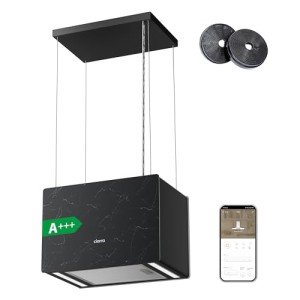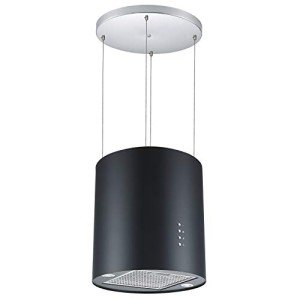It's Time To Forget Island Hoods: 10 Reasons Why You No Longer Need It
본문
Island Hoods: An Overview of Their Purpose, Styles, and Benefits
Island hoods have become a popular choice in modern kitchen design, serving both practical and aesthetic purposes. As the centerpiece of lots of kitchen areas, these versatile ventilation systems not just help remove smoke, odors, and heat however also improve the general atmosphere of the area. This short article looks into the different kinds of island hoods, their advantages, setup factors to consider, and maintenance requirements.
What is an Island Hood?
An island hood is a type of range hoods for islands hood that is suspended above a kitchen island, normally where a cooktop lies. Unlike wall-mounted range hoods that are connected to a wall, island hoods are developed to be installed from the ceiling, permitting a smooth, unobtrusive look while providing efficient ventilation.
Advantages of Island Hoods
island extractor fan kitchen hoods feature numerous benefits that raise both the performance and aesthetic appeals of a kitchen. Here are some essential benefits:

1. Improved Ventilation
island kitchen hood hoods stand out at efficiently catching smoke, steam, and air-borne grease produced while cooking. They guarantee that the kitchen island extractor fan stays fresh and without unwanted smells.
2. Visual Appeal
Offered in various styles, colors, and products, island hoods serve as a centerpiece in the kitchen. They can complement the overall design style, adding visual interest and beauty.
3. Variety of Designs
Island hoods are available in numerous designs, from conventional to modern, allowing house owners to choose one that matches their taste and kitchen style.
4. Boosted Cooking Environment
By removing excess heat and humidity, island hoods develop a more comfortable cooking space.
5. Increased Home Value
Updating to a modern island hood can add worth to a home, appealing to potential buyers who prioritize kitchen looks and functionality.
Kinds Of Island Hoods
Island hoods come in different designs and performances. Here are some popular types:
| Type of Island Hood | Description | Pros | Cons |
|---|---|---|---|
| Ducted | Ventilation system connected to external ducting. | Efficient air elimination; suitable for m1bar.com heavy cooking. | Installation can be made complex; needs ductwork. |
| Ductless | Uses charcoal filters to clean and recirculate air. | Simpler to set up; no external venting required. | Less effective for heavy cooking; requires regular filter replacement. |
| Wall-Mounted | Installed on a wall; can be used in an island with a cooktop against a wall. | Versatile; can fit various kitchen layouts. | Restricted to cooktops versus walls. |
| Downdraft | A retractable system that rises from behind the cooktop. | Space-saving style; discreet when not in usage. | Less effective than conventional hoods for ventilation. |
Installation Considerations
Selecting and installing an island hood includes numerous important aspects, consisting of:
Ceiling Height: Ensure the hood is set up at the appropriate height. Typically, there ought to be in between 30 to 36 inches above the cooktop.

Ducting vs. Ductless: Decide whether a ducted or ductless system is more suitable based on the kitchen design and building and construction.
Ventilation Power: Measure the BTU (British Thermal Units) produced by the cooktop or range to identify the required CFM (cubic feet per minute) for proper ventilation. As a basic standard:
- 300 CFMs for electric cooktops.
- 600 CFMs for gas cooktops.
Design and Size: Choose a design and size that complements the kitchen's general visual while ensuring it has the power to handle your cooking requires.
Electrical Requirements: Ensure that installation adheres to regional structure codes, especially concerning electrical and gas lines.
Maintenance of Island Hoods
Appropriate upkeep of Trendy island range hood hoods is vital for guaranteeing effective operation and longevity. Here are some maintenance ideas:
Regular Cleaning: Clean the outside and interior surface areas routinely to avoid grease accumulation. Use appropriate cleaners based on the hood's material (stainless steel, glass, etc).
Filter Replacement: extractor fan for island ductless hoods, replace charcoal filters every 3 to 6 months. Metal filters ought to be cleaned every few weeks, depending upon use.
Examine Ductwork: For ducted hoods, periodically examine the ductwork for any blockages to preserve airflow performance.
Professional Servicing: Consider having an expert examine and service the hood every year to guarantee optimal efficiency.
FAQs
1. Are ducted or ductless island hoods much better?
Each type has its advantages. Ducted hoods are more efficient for heavy cooking as they vent air outside, while ductless hoods are simpler to set up and can work well in areas without external ventilation options.
2. What is the ideal height for installing an island hood?
The perfect height for mounting an island hood is usually in between 30 to 36 inches above the cooking surface to guarantee optimal efficiency and security.
3. Do island hoods need professional installation?
While some house owners might select to install island hoods themselves, working with an expert is advised, especially for ducted designs that require specialized installation.
4. How typically do I need to clean up the filters?
It is recommended to tidy metal filters every 1-2 months and change charcoal filters in ductless hoods every 3-6 months, depending on usage.
5. Can an island hood improve home value?
Yes, setting up a modern and elegant island hood can boost the kitchen's appeal, potentially increasing the total worth of the home.
Island hoods offer an unique combination of functionality and design, making them an attractive choice for modern kitchen areas. Comprehending their types, benefits, installation considerations, and upkeep requirements can help homeowners make informed decisions. With appropriate care, an island hood can function as both an important appliance and a beautiful centerpiece in any kitchen area.

